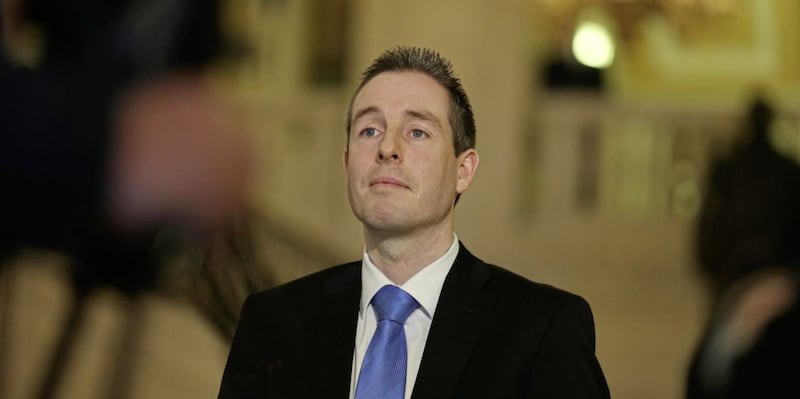STORMONT officials told former DUP communities minister Paul Givan that the advantages of running an Irish language bursary scheme were “many” just days before he controversially slashed the project.
Mr Givan sparked anger among the Irish language community and nationalists when he decided to end the £55,000 bursary scheme days before Christmas last year.
The Liofa Gaeltacht Bursaries Scheme provided small grants for people from disadvantaged backgrounds who wanted to learn Irish.
The decision to slash the project came in the middle of the Renewable Heat Incentive (RHI) scandal last December when it emerged that scheme had run £490m over budget.
Now it has emerged that in the days before Mr Givan stopped the scheme he was told of its advantages by a department official.
The DUP man later did a U-turn and reinstated the popular scheme.
In a message sent by the department before Christmas, officials confirmed that “because of ‘efficiency savings’ the department will not be providing the Liofa Bursary Scheme in 2017.
“Happy Christmas and happy new year”.

However, the department has now claimed it “does not hold any information relating to ‘the consideration of ‘efficiency savings’ for December 2016.
Fresh details of the controversy emerged in response to a Freedom of Information request lodged by the Committee on the Administration of Justice.
The Department for Communities (DfC) originally blocked the release of information about the scheme but later relented when officials were asked to carry out a review.
The official who wrote the briefing paper said that “the post project evaluation of last year’s Gaeltacht Bursary Scheme indicates a positive impact on the language ability of those who attended the courses.”
Figures show that there were 510 applicants to the scheme with 100 being offered bursaries resulting in 97 people completing the course.
The official presented the minister with three options which included having no scheme, introduce a limited scheme costing £27,000 to provide a 100 place scheme costing £55,000.
The official said: “The advantages of running a Gaeltacht Bursary Scheme are many.”
“Every year children and teachers are encouraged to sign up to Liofa, bringing the initiative closer to its target of 20,000 people by 2020.”
The spokeswoman also said the scheme would “also help the department in achieving indictor 27 of the (draft) programme for government, which is to improve cultural participation”.
The official added that the “disadvantages of not running the Gaeltacht Bursary Scheme include the potential for negative media attention, and less young people and adults able to afford to attend the Gaeltacht to improve their Irish this week”.
Six days after the brief was sent to the minister, on December 19, an email was sent by Mr Givan’s private office stating “minister has commented ‘no scheme’.”
Deputy director of CAJ Daniel Holder said: “The papers do reveal that officials had advocated the benefits of continuing the programme to the minister – we are therefore owed an explanation as to the actual reason behind the minister’s then decision to pull it.”







